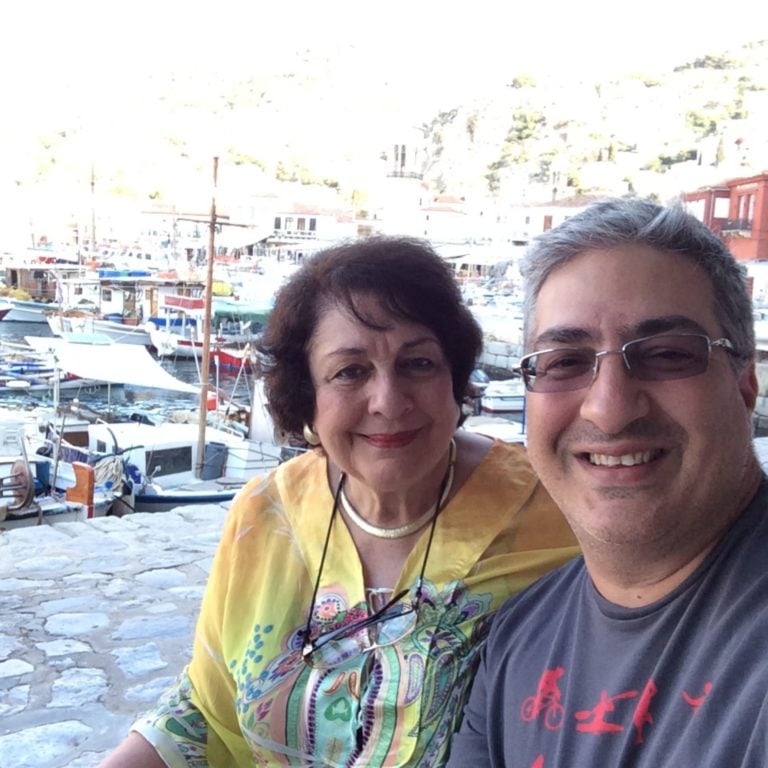As I made my way through 11 years of Greek school, I watched my class sizes dwindle down and the age gap widen.
I remember sitting in my class that catered for grades four to nine.
I would sit there wondering what all my other Greek friends got up to on their Saturday mornings as I sat there, writing down my notes.
At the time I was baffled that more people were not sitting in the same room, learning a language that connected them to so much history and culture.
Although there is a great deal of Greek-Australians who feel knowing Greek is imperative to the essence of being Greek, perhaps it’s not the only way and perhaps not everyone feels that strong of a connection.
Olympia Valance
Actress, model and Victorian Multicultural Ambassador
https://www.instagram.com/p/B02w6GDAwxO/
English was the main language spoken in Olympia Valance’s household growing up, which meant she already felt behind at Greek school.
“The last thing I wanted to be doing on my weekend was more school work, as I’ve never been academic. On top of that, I found the whole experience that much more difficult because I didn’t know a scrap of Greek…I was behind in Greek school before I even started, so I always felt a bit dumb and like I couldn’t ever measure up. There were also a couple of mean teachers (I say this from the perspective of young Olympia of course!), so there was enough there to talk my mum out of sending me.”
Being Greek, or rather feeling Greek extends far beyond the language says Ms Valance, as trips back to Greece have strengthened her sense of heritage.
“I try and spend as much time in Greece as possible, which of course due to COVID-19 and the state of the world currently, is not possible. Although I don’t speak Greek, Greece is where I feel the most at home, the most at peace. It feels inherently part of who I am and how I came to be in this world and when I am physically there, it somehow connects me back to that deep part of my heart and soul. The importance they place of celebrating life, living large and enjoying it all while we have the chance to is very much aligned with how was I raised too.”
Learning any language is not easy, but Ms Valance has found a solution that works greatly in her favour.
“I do think one of the easiest and fastest ways to pick it up is to be on the ground over there, immersed in it day after day. So obviously the answer for me is spending more time in Greece!”
READ MORE: Young Greek Australians tell us what we can do to help them retain their Greek heritage
Captain George Kailis
Vice President of the Australian Federation of Air Pilots and pilot

Captain George Kailis’ family first migrated to Australia from Greece around 1915 and despite not having learned Greek himself, his heritage still remains prevalent in his life.
“I will never disconnect from my Greek heritage. I’m christened Greek Orthodox, my children are…I’ve back to my home island, with mum maybe back in 2014, back to Kastellorizo, I loved it. I want to take my children there. I think you can never forget where you’ve come from because you need to know that to know where you’re going.”
Although Mr Kailis chose sports over Greek school growing up, rebelling against the early Saturday morning classes, he still participated in important cultural events.
“We were told the stories of Greek independence, we were always dressed up on Greek Independence Day in our gear and go to the marches and were very much reminded of the fighting spirit that the Greeks have and their very strong independence and their contribution to science, art, philosophy.”
In time, Mr Kailis hopes to learn Greek again when life settles down a little more.
“When things slow down in my life that I pull away from this union stuff and parenthood so to speak, I’m definitely going to learn it…The next time I go back to Greece I want to be able to speak it. Because it would be a very different Greece for me I think.”
READ MORE: Captain George Kailis unveils the reality of a career in aviation
Tina Pablador*
Primary Educator

Tina Pablador’s relationship with her Greek heritage is somewhat different, yet not uncommon.
Growing up living with her grandparents made understanding Greek more of a necessity.
“I wasn’t encouraged but more so expected to speak Greek having lived with Greek speaking grandparents. Though the expectation came without any formal education, my parents primarily spoke English to me as a child so this is what I acquired. I picked up dribs and drabs around the Greek that I heard and was expected to use whatever I knew.”
At times, families may be too involved or too little involved in expressing their heritage in a way in which children can connect. Other times, external factors may have a greater impact.
“I felt a stronger connection to the Australian context that I’ve grown up with, primarily through attending public education, consuming western media and being friends with people from a variety of backgrounds during my childhood. And also through living in Australia and never having travelled to Greece until my 20s.”
*Name changed to protect the identity of those interviewed









